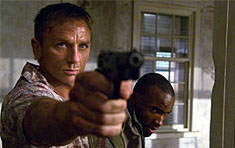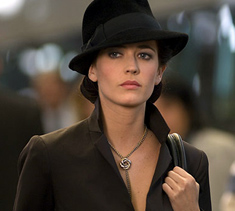|
Entertainment
Weekly 17/11/06
By Owen Gleiberman

In the startling
sequence that kicks off Casino Royale, we see James Bond
(Daniel Craig, pictured), early in his career as a British secret
service agent, dispatching two enemies in a pair of initiation kills
that will elevate him to double-0 status. One of the kills is
classic Bond, elegant and almost witty in its efficiency. Intercut
with this icy execution is a far more lurid episode in which Bond
beats the crap out of someone in a men's room, bashing him bloody
until he expires. It's a side of Bond we haven't seen before — but,
of course, it's a side that was always there. (You don't get a
license to kill for being a nice guy.) In Casino Royale, Bond
is still learning to tame his impulses into a style, and he's all
the more dangerous because of it.
It's almost impossible to think of James Bond without fastening on
the trappings: the gadgets, tuxedos, and martinis, the cocoa-butter
babes, the slightly ironic thrust of macho perfection incarnated by
the words ''Bond, James Bond.'' In many ways, though, the attitude
of Bond, the internal quality that makes him tick, has long been
reduced to just another trapping. The moment, really, that Sean
Connery left the series, Bond became a jokey superhero in a dinner
jacket, a guy who never flinches because he knows that he's sure to
come out in his favorite position: on top. |
 |
Casino Royale,
which is based on the first of Ian Fleming's British spy novels (it
was published in 1953), relaunches the series by doing something I
wouldn't have thought possible: It turns Bond into a human being
again — a gruffly charming yet volatile chap who may be the swank
king stud of the Western world, but who still has room for rage,
fear, vulnerability, love. Daniel Craig, the superb British actor
who has taken over the role, has small, wounded-looking eyes of
coldest android blue, ears that stick out, and a mouth that puckers
into a scowl. With his blondish hair trimmed to a thatchy bristle,
Craig is handsome, and buff as hell, but not necessarily the most
handsome guy around — he looks like a dyspeptic Steve McQueen. The
fact that he isn't tall adds to the sense that he's always working a
bit harder, that he's a badass with too much eating away at him to
bother playing pretty-boy games. Craig's 007 has an itchy trigger
finger, he treats M (Judi Dench) like a meddlesome aunt, and he
growls at a bartender who asks if he wants his martini shaken or
stirred, ''Do I look like I give a damn?''
That's the beauty of the movie. A Bond who doesn't give a damn,
who's made affectless, even haunted, by what his job brings out in
him, is a Bond we can all give more of a damn about. He speaks to an
age of desperation, when the cosmetic barely holds sway over the
cutthroat. In Casino Royale, Bond does many things he's done before
— turns criminal pursuits into high-flying death stunts, plays
world-class poker, faces worldclass torture. At one point, he
engages in such a fierce battle inside a Venice palazzo that the
building comes crumbling down (that's beyond spectacle — it's
blasphemy). Yet Craig, speckled with facial cuts, plays Bond with an
almost bruised virility, making each of these actions an expression
of unruly will. Casino Royale, the most exciting Bond film
since On Her Majesty's Secret Service, has everything you
want in a pop entertainment: physical audacity, intrigue, romance,
but also a charge of personality that stayed with me for days. |
 |
Directed by Martin
Campbell (GoldenEye), the movie has a plot full of the usual
vaguely topical hugger-mugger, with Bond trying to trap a banker to
world terrorists — a numbers genius named Le Chiffre, who weeps
tears of blood. Played with velvet Eurotrash sadism by Mads
Mikkelsen, this mad capitalist isn't flamboyant enough to be a
mythical supervillain, but when he and 007 face off in a poker
tournament at the Casino Royale in Montenegro, the eye contact is
electric, and it's one of the great sequences in any Bond film.
Craig convinces you that Bond, shoving million-dollar chips to the
center of the table, is literally ignoring the cards —that the
bluffing, the psychology is all. After an attempt is made to poison
him, he tells his nemesis that the recent intermission ''nearly
killed me,'' and Craig infuses that joke with a roughneck venom
worthy of Connery.
There is also, of course, a girl, but this time she's a true
romantic adversary. Vesper Lynd, played by the dancing-eyed French
actress Eva Green, is a British Treasury official assigned to stake
Bond in the poker game and, generally, keep tabs on him, and as
these two fling insults back and forth, they melt each other's armor.
Bond hasn't just met a babe; he has met his match. And we have met
him, as if for the first time.
 |


